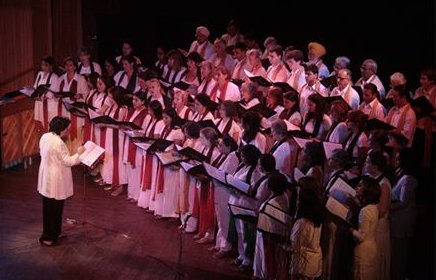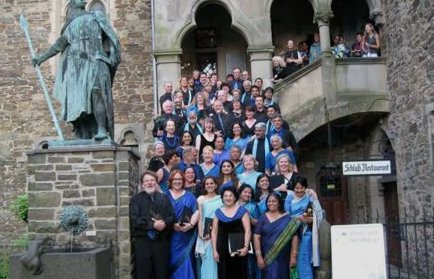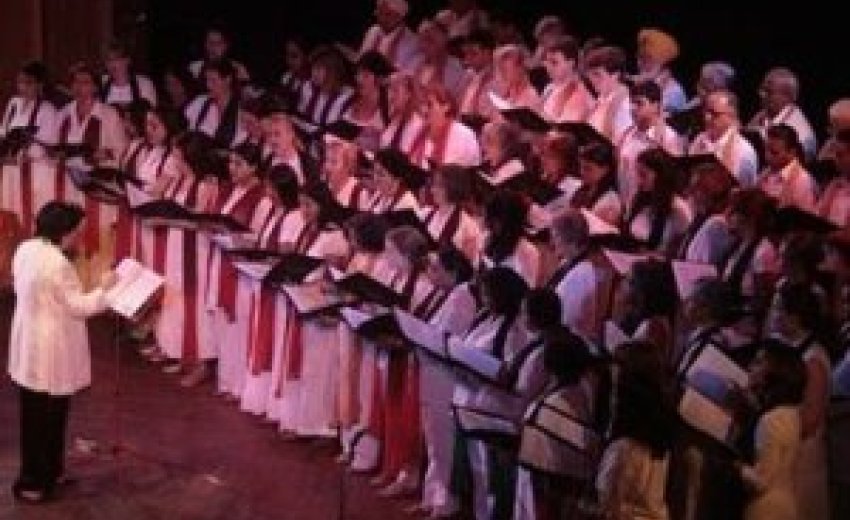 |
 |
| Capital City Minstrels, a popular choral group (Sikh included - back row) in Delhi | |
Christmas belongs to everyone now. The Capital City Minstrels, a popular choral group in Delhi, is proof of the widening of a festival once limited to those who believed Jesus was the son of God. Advertising professional Prabhsharan Singh Kang, a practising Sikh, has been part of the choir for 11 years. He says he absolutely loves it and "it's the best thing that happened to my life - it keeps me young and acts as a stress-buster." Maxwell Pereira, former chief of Delhi traffic police is one of the Minstrels' longest-serving members. He says it is a perfect snapshot of change - 20% of its members were not Christian when it began 16 years ago; today, it's half and half.
There are some obvious reasons. The first is Christmas's commercial worth. Like Diwali, it's the time of year families expect to spend and most Indian businesses have adapted to the dual festive rhythm of making money. In Delhi's famous spice market, Khari Baoli, shopkeepers have started to sell sealed packets of dry fruit for Christmas cake. It makes the process of baking Christmas cake easier. Arguably, it also widens the appeal of baking cake for those who aren't Christian.
In Bangalore, discounts and gift vouchers make Christmas a season of joy for many. For Kabir Lumba, managing director of the retail chain Landmark Group, it means sales go up by 10-11%. "Christmas has gone beyond the religious connect - it doesn't matter what your background is," says Lumba with satisfaction. For Koshy's, which is famous for its Christmas goodies, the build-up to the big day starts as early as November and it's not as if only Christians are buying.
And in Shillong's main Police Bazaar, Christmas season is considered the best time to open a new store or release a CD, particularly cover versions of Christmas songs by local bands.
In an interesting multi-faith touch that goes the other way, for Jharkhand's Christian tribals the season means bhajans and arsa - a sweet made out of jaggery and powdered rice. Some parts of Chota Nagpur have a unique celebration that sees the elders of a family collecting flour from different households the night before Christmas. It goes into khullai roti, a bread that is hidden in the forest for a young people's treasure hunt. The winner is felicitated and given gifts.
But has the stereotyped perception of the average Indian Christian changed from the view that they were degenerate and dissolute byproducts of colonization? Not really, say experts, even though much of the stereotype was based on myth. Sociologist T K Oommen says it was always wrong to regard the entire Christian community in this way. "Christians are of three types - those who claim descent from St Thomas, one of Christ's apostles who visited India in the first century, converts from SCs/STs/OBCs, and Anglo-Indians. Some 67% belong to the second category."
Seventy per cent of Christians live in rural and small town India. "South India, the northeast and tribal areas of Chota Nagpur have 90% of India's Christians, while the Indo-Gangetic plains just 1%", says Oommen. The extent of assimilation is such that names like Reshma, Nirmala and Sushma are common. Many Indian Christians even perform aarti, points out Father Dominic Emmanuel, spokesperson of the Delhi Catholic archdiocese.
In any case, India's Christian community is too diverse to be lumped into one category, being a disparate group of 252 denominations. The Christian in Kerala or Tamil Nadu is entirely different from tribal co-religionists in central and north-eastern India and Dalit Christians.
Unsurprisingly, says Oommen, the Christian typically doesn't have much nuisance value and lacks political clout. But Roy Paul, former member of the Union Public Services Commission and ex-aviation secretary, says the "quiet Christian" may be more on account of their being better educated than other communities. But Emmanuel says the Christian is valued for running some of India's best hospitals, schools and NGOs but regarded with suspicion for proselytization. "The Census has consistently put the Christian population at around 2%, giving the lie to this," he says, but much of India still believes Christians want to spread the word.
With reports from Jaideep Deogharia in Ranchi, Aneesha Bangera in Bangalore and Manosh Das in Shillong
